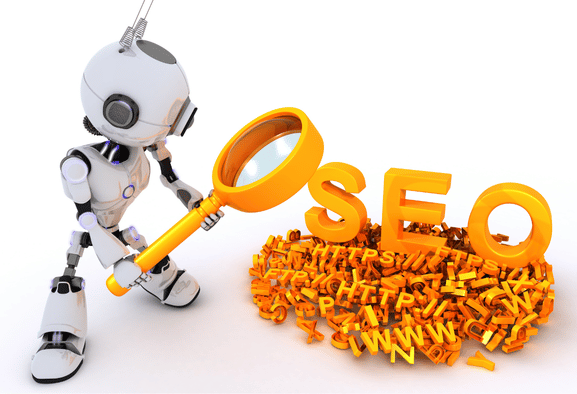Introduction
In today’s rapidly evolving digital landscape, Artificial Intelligence (AI) is revolutionizing how businesses optimize their online presence. Search Engine Optimization (SEO), once a domain driven by manual strategies and guesswork, is now more sophisticated thanks to AI-powered tools and techniques. For businesses like Cheric Technologies, understanding the relationship between AI and SEO is crucial to staying competitive in the digital marketplace. As one of the best digital marketing agencies in New York, Cheric Technologies is dedicated to staying at the forefront of these advancements.
Let’s dive deep into the transformative role of AI in SEO, how it’s shaping the future, and what you need to know to harness its potential.

What is AI in SEO?

Artificial Intelligence, in the context of SEO, refers to the use of machine learning, natural language processing (NLP), and data-driven algorithms to enhance search engine optimization strategies. AI helps marketers understand search engine behavior, predict trends, and deliver user-centric content more effectively.
Google, the world’s leading search engine, has integrated AI into its core algorithms. Technologies like RankBrain, BERT (Bidirectional Encoder Representations from Transformers), and MUM (Multitask Unified Model) are prime examples of AI transforming the way search engines interpret queries and rank content. Staying updated with these advancements is crucial for any top digital marketing company in New York to deliver exceptional results for clients.
The Key Ways AI is Impacting SEO
AI is transforming keyword research by analyzing user intent, context, and search trends. Instead of relying on traditional tools, marketers can now use AI-powered platforms to predict keyword performance and identify the terms most relevant to their audience. Semantic search capabilities allow businesses to understand not just exact match keywords but also synonyms and related phrases, which are essential for content that aligns with how users naturally search online.
Content creation and optimization have become smarter with AI. Tools powered by AI analyze existing content, search patterns, and audience preferences to suggest improvements. Platforms like Grammarly and SurferSEO enhance readability and tone while ensuring SEO compatibility. Predictive analysis enables businesses to anticipate what type of content will resonate with their target audience, helping to create pieces that meet user needs effectively.

Voice search optimization is another area where AI has made a significant impact. With the increasing use of voice assistants like Alexa and Siri, optimizing for conversational queries is more important than ever. AI decodes natural language queries, enabling businesses to adapt to these search patterns. Long-tail and question-based keywords play a critical role in this process, ensuring visibility in voice search results. AI also helps optimize content for featured snippets, which are often the source of answers for voice search queries.
Improving user experience (UX) is now a priority for search engines, and AI plays a significant role in achieving this. AI-powered tools analyze user behavior on websites, such as clicks, scrolls, and time spent on pages, to identify areas for improvement. Personalization has become a key focus, as AI tailors content recommendations to individual preferences, enhancing engagement and retention. For a top digital marketing company in New York like Cheric Technologies, ensuring a seamless user experience is part of delivering outstanding digital solutions
SEO automation is perhaps one of the most time-saving benefits of AI. Tasks such as technical audits, link building, and rank tracking can be automated, freeing up marketers to focus on strategy and creativity. Platforms like BrightEdge and SEMrush provide real-time adjustments based on algorithm changes, ensuring campaigns remain effective even as the search landscape evolves.
AI Algorithms Used by Search Engines

Search engines, particularly Google, use AI-driven algorithms to deliver better search results. Understanding these algorithms is essential for effective SEO strategies. RankBrain focuses on understanding user intent and the context of queries, while BERT enhances the comprehension of natural language queries. MUM goes a step further by processing information in multiple languages and formats, answering complex queries more effectively. For the best digital marketing agency in New York, aligning strategies with these advanced algorithms is key to ensuring clients achieve high search rankings
Challenges of Using AI in SEO
Despite its advantages, implementing AI in SEO comes with challenges. AI relies heavily on data, and limited data can reduce its accuracy and effectiveness. The complexity of search engine algorithms, which are constantly evolving, requires continuous learning and adaptation. Over-reliance on AI can also lead to generic content that lacks the creativity and human touch needed to stand out. Businesses must strike a balance between leveraging AI and maintaining authenticity in their content.

Best Practices for Leveraging AI in SEO

To effectively use AI in SEO, businesses should invest in reliable AI tools that streamline processes and provide actionable insights. Focusing on user intent when creating content ensures that it addresses the specific needs and queries of the target audience. Optimizing for voice search using conversational language and question-based formats is another important aspect. Regularly monitoring analytics helps businesses understand what works and make data-driven adjustments to their strategies. While AI enhances efficiency, it’s crucial to retain the human element in content to make it engaging and relatable
Future of AI and SEO
To effectively use AI in SEO, businesses should invest in reliable AI tools that streamline processes and provide actionable insights. Focusing on user intent when creating content ensures that it addresses the specific needs and queries of the target audience. Optimizing for voice search using conversational language and question-based formats is another important aspect. Regularly monitoring analytics helps businesses understand what works and make data-driven adjustments to their strategies. While AI enhances efficiency, it’s crucial to retain the human element in content to make it engaging and relatable

Conclusion
AI has become an indispensable part of effective SEO, offering unparalleled insights and automation capabilities. For Cheric Technologies, one of the top digital marketing companies in New York, leveraging AI tools and techniques is not just a strategy but a necessity in the fast-evolving digital landscape. By understanding the role of AI in SEO, businesses can craft strategies that align with search engine algorithms and deliver exceptional value to their audiences.
Adopting AI in SEO ensures improved rankings, enhanced user experiences, and a user-centric approach that builds trust and loyalty. As the digital world continues to evolve, staying informed and innovative will be key to maintaining success in the competitive realm of online marketing.
FAQs:
How is AI transforming SEO practices?
AI is revolutionizing SEO by enhancing keyword research, optimizing content creation, improving user experience, and automating repetitive tasks. It helps businesses understand user intent better, predict search trends, and deliver personalized, high-quality content that aligns with search engine algorithms
What AI algorithms are used by search engines like Google?
Google uses AI algorithms such as RankBrain, BERT, and MUM. RankBrain focuses on understanding user intent, BERT enhances the comprehension of natural language queries, and MUM processes information across multiple languages and formats to answer complex queries effectively.
How does AI improve keyword research for SEO?
AI-driven tools analyze user behavior, intent, and search trends to identify relevant keywords, including long-tail and semantic terms. These insights help businesses target the right audience and optimize their content for better visibility.
Can AI tools replace manual SEO efforts?
While AI tools can automate many SEO tasks like technical audits, rank tracking, and link building, they cannot completely replace manual efforts. A human touch is essential for creativity, authenticity, and strategy, ensuring content remains engaging and user-centric.
Why is AI important for voice search optimization?
AI decodes natural language and conversational queries, making it crucial for optimizing content for voice search. By focusing on question-based, long-tail keywords and optimizing for featured snippets, businesses can enhance their visibility in voice search results.



Leave a Reply